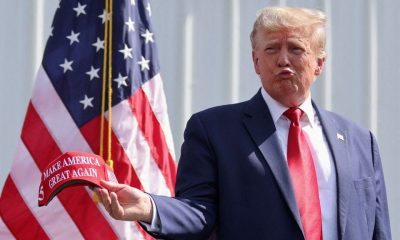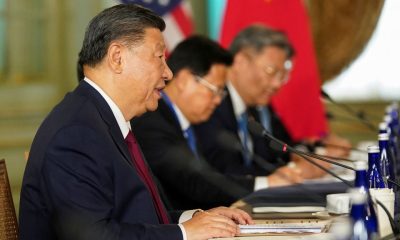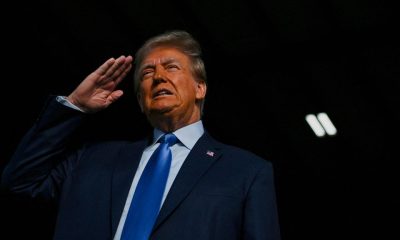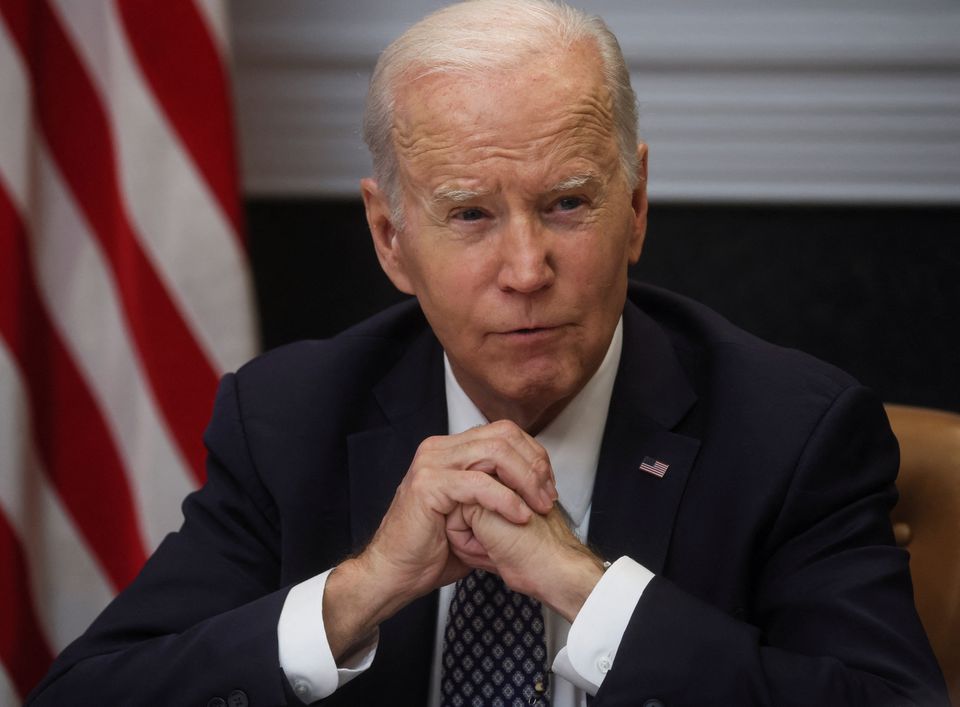AFRICA
Trump Imposes Hard Line Sanctions on Iran
Sanctions levied against the Iranian government by the Trump Administration took effect Tuesday, with another round of more stiff round of sanctions to come in the near future. The Trump Administration has hopes that these sanctions will help cripple the Iranian economy and force concessions from the capital of Tehran. In fact, the announcement of sanctions has already begun to take an effect on Iran’s economy.
Iran’s currency, the rial, has lost nearly half of its value since April, creating massive inflation that has ballooned to over 13% as of June. According to BBC Persia reporter Amir Paivar, this will have grave consequences for the Iranian economy, “That in turn probably will trigger a recession because of fluctuating exchange rates, lack of financing means Iran cannot import machinery and technology, and manufacturing will suffer”. Trump took to Twitter on Tuesday to confirm the new sanctions, stating: “The Iran sanctions have officially been cast. These are the most biting sanctions ever imposed, and in November they ratchet up to yet another level.
Anyone doing business with Iran will NOT be doing business with the United States. I am asking for WORLD PEACE, nothing less!”. The sanctions posed by the Trump Administration come in stark contrast with Obama’s Iran Deal, the Joint Comprehensive Plan of Action, which Trump has recently pulled out of. In order to delay Iran’s development of nuclear weapons and deter its ties to terrorism, Obama granted Iran access to billions in frozen assets, as long as Iran would adhere to regular and stringent checks on its nuclear program. Despite Iran already being granted access to these frozen assets, Trump decided to take a hard line approach and attempt to put a major economic squeeze on Iran in order to control the rogue state’s behavior.
These sanctions will aim to cripple a number of Iranian industries, including transportation sectors such as the automotive and airline industries. This will, in turn, affect U.S and European companies as well, such as Boeing and Airbus. These companies will lose contracts estimated at about $39 billion that were meant to help refurbish and modernize Iranian commercial airliners, according to U.S. Treasury Secretary Steven Mnuchin. Additionally, these sanctions will suppress Iran’s ability to buy U.S currency and trade within the industries of aluminum and steel.
These sanctions will also severely limit Iran’s ability to export goods, such as Persian rugs. The loss of European companies dealing both in and with Iran may be the greatest threat to its economy. Corporations will be forced to end any type of relationships they possess with Iran in fear of U.S retaliation. These sanctions are deeply troubling in the eyes of European Union officials, who claim that they will provide European businesses with a legal shield to protect their dealings with Iran. This is paramount for both the EU and Iran, as trade between the two entities is valued at an estimated $23 billion, about 75% of which is related to the energy industry.
However, the threat of alienation from the U.S trade system has been enough to deter many businesses from Iran, as outlined by Amir Paivar: “If you are a big multi-national with a massive exposure to U.S. market, and at the same time you have a small business in Iran, it’s not a difficult choice to make quite frankly… At the end of the day, it’s a risk and reward calculation. They are more accountable to their shareholders and boards rather than being accountable to what the politicians in Brussels decide.” Iran’s economy is expected to plummet even more aggressively once the second round of sanctions have been imposed. With Iran’s oil exports at an estimated $36 billion in 2016, this number could drop by 67% following these sanctions, according to the Council on Foreign Relations. While it is possible countries such as India and China may attempt to find ways around the U.S-imposed sanctions, there is no guarantee and the loss of revenue on oil exports is practically inevitable.
AFRICA
The UK paid Rwanda an additional $126 million for the contested migrant plan.
As the tab for Britain’s controversial proposal to relocate asylum seekers to the East African nation continues to increase, the United Kingdom paid Rwanda an extra 100 million pounds ($126 million) in April. This was in addition to the 140 million pounds it had already provided Rwanda.
Even though the Rwanda project is at the core of the policy that British Prime Minister Rishi Sunak is employing to discourage illegal immigration, there have been no individuals sent to Rwanda as of yet due to legal challenges that have taken place since the initiative was introduced in 2022.
After Sunak’s immigration minister resigned this week, the polarizing policy is now regarded as a danger to Sunak’s leadership, which is anticipated to be challenged in the election that will take place the following year.
According to a letter that the British Ministry of the Interior issued on Thursday, the United Kingdom plans to give Rwanda fifty million pounds in addition to the 240 million pounds it has already provided to the East African nation.
The opposition Labour Party criticized the disclosures regarding the rising cost of a scheme that legal experts warned could collapse. Some parliamentarians within Sunak’s party are also expected to express their disapproval of the idea.
A statement by Yvette Cooper, the shadow interior minister for the Labour Party, on social networking site X, said, “Britain cannot afford more of this costly Tory chaos and farce.”
On Friday, however, the newly appointed minister for legal migration, Tom Pursglove, explained what he called the “investment” of 240 million pounds. He stated that once the Rwanda policy was operational, it would reduce the money spent on hosting asylum-seekers in the United Kingdom.
“When you consider that we are unacceptably spending 8 million pounds a day in the asylum system at the moment, it is a key part of our strategy to bring those costs down,” Pursglove explained to Sky News.
Pursglove stated that the money donated to Rwanda would assist in the country’s economic growth and help get the asylum relationship with the United Kingdom up and running.
There was no connection between the money sent to Rwanda and the treaty that the two nations signed on Tuesday, according to the letter from the Ministry of the Interior.
The treaty aims to respond to a ruling by the Supreme Court of the United Kingdom, which stated that the deportation plan would contravene local laws based on international human rights standards.
“The Government of Rwanda did not ask for any payment in order for a Treaty to be signed, nor was any offered,” according to the correspondence.
After Robert Jenrick resigned from his position as immigration minister on Wednesday, Sunak made a plea to fellow Conservative parliamentarians on Thursday to come together in support of his Rwanda proposal. He stated that the emergency legislation the government had drafted to get the scheme up and running did not go far enough.
Africa
UK interior minister travels to Rwanda to resurrect asylum plan.
On Tuesday, the Minister of the Interior of the United Kingdom, James Cleverly, came to Rwanda to sign a new treaty. This was done to circumvent a court judgment that blocked the government’s contentious policy of transferring asylum seekers to the East African nation.
The Rwandan plan is at the core of the government’s attempt to reduce migration, and it is being closely monitored by other nations who are considered to be considering policies that are comparable to Rwanda’s.
In a decision handed down a month ago, the Supreme Court of the United Kingdom stated that such a move would violate international human rights norms embedded in domestic legislation.
Following the decision, the United Kingdom has been making efforts to revise its agreement with Rwanda to incorporate a legally binding treaty that guarantees Rwanda would not remove asylum seekers brought there by the United Kingdom. This is one of the primary concerns of the court.
Several attorneys and charitable organizations have said that it is highly improbable that deportation flights will begin before the election. With a lead of more than ten percentage points in the polls, the opposition Labour Party intends to abandon the Rwanda policy if it is victorious.
A meeting between Cleverly, who arrived in Kigali, the capital of Rwanda, on Tuesday morning, and Vincent Biruta, the country’s Minister of Foreign Affairs, is scheduled to take place to sign the agreement.
“Rwanda cares deeply about the rights of refugees, and I look forward to meeting with counterparts to sign this agreement and further discuss how we work together to tackle the global challenge of illegal migration,” Cleverly says.
The United Kingdom aims to transfer thousands of asylum seekers who came to its beaches without authorization to Rwanda under the plan that was agreed upon the previous year. This discourages migrants from crossing the Channel from Europe in tiny boats.
In exchange, Rwanda has been given an initial payment of 140 million pounds, equivalent to 180 million dollars, along with the promise of additional funds to cover the costs of housing and medical treatment for any deported persons.
THE PRESSURE
A great deal of pressure is being put on Prime Minister Rishi Sunak to reduce net migration, which reached a record high of 745 thousand people in the previous year, with the vast majority of migrants entering through legal channels.
“Stop the boats” is one of the five goals that Sunak has set for his government. The influx of asylum seekers who pay people smugglers for their crossings of the Channel, which frequently take place in boats that are overloaded and not seaworthy, is one of the aims that Sunak has set.
The Supreme Court determined that the Rwanda plan should not be implemented because there was a possibility that refugees who were deported would have their claims incorrectly evaluated or that they would be sent back to their country of origin to suffer persecution.
In the latter part of this week, it is anticipated that the new treaty will be followed by the release of legislation declaring Rwanda a so-called safe nation. This law is intended to prevent legal challenges against the planned deportation flights.
Despite this, this will probably result in a fresh set of political and legal difficulties.
An immigration attorney at Harbottle & Lewis named Sarah Gogan stated that the government’s policy will be challenged due to Rwanda’s history of violations of human rights provisions.
“Rwanda is an unsafe country and this is not a quick fix,” added the politician. “You cannot in a matter of weeks or months reform a country and turn it into one with an impartial judiciary and administrative culture.”
Another “gimmick” was what Yvette Cooper, the spokesperson for the Labour Party’s home affairs department, called the most recent measures proposed by the administration.
Whether or not to design the law in a way that would avoid subsequent legal challenges is still up for debate by the administration.
Several members of the Conservative Party in parliament are putting pressure on the government to incorporate a “notwithstanding” clause into Rwanda’s policy. This clause would disapprove the domestic and international human rights commitments of the United Kingdom regarding Rwanda.
However, some politicians within the ruling party, such as Robert Buckland, have stated that such a move would be “foolish” and undermine the Good Friday Agreement, which is primarily responsible for ending three decades of carnage in Northern Ireland. This is because the European Convention on Human Rights supports the treaty.
AFRICA
Madagascar leader wins presidential vote, constitutional court says
On Friday, the High Constitutional Court of Madagascar certified Andry Rajoelina, the current President of Madagascar, to be the victor of the election a month ago, essentially granting him a third term in office.
Following the dismissal of several challenges submitted against the preliminary results by the electoral board, the court said that Rajoelina collected 58.96% of the votes that were cast.
Florent Rakotoarisoa, the chairman of the High constitutional court, stated that “Andry Rajoelina is elected as the president of the republic of Madagascar and is taking his functions as soon as the swearing (is conducted) comes to an end.”
The rejected challenge was submitted by the politician Siteny Randrianasoloniaiko, who received 14.39% of the vote, according to the court. This was one of the challenges that was denied.
Ten of the thirteen candidates chose not to participate in the election; nevertheless, their names were already on the ballot, so they could still divide the remaining votes. The court reported that the turnout was 46.35 percent.
The election on November 16 was preceded by weeks of demonstrations, during which the opposition accused Rajoelina of having fostered conditions that were unjust to the election.
The charges that the vote was rigged have been refuted by Rajoelina, and the army has issued a warning against any attempts to destabilize the country.
As far as the opposition is concerned, the voter turnout for the election was the lowest it has ever been in the country’s history.
Hajo Andrianainarivelo, a former minister who was one of the candidates who chose to abstain from voting, has committed to fight against what he has described as a lack of respect for the rules of the state and the tyranny of the people.
“The popular fight begins now,” he declared on Thursday referring to the ongoing conflict.
Rajoelina, now 49 years old, initially won power in a coup in 2009. After resigning from his position as the head of a transitional authority in 2014, he went on to win another election in 2018 and regain his position as president.
-

 Europe7 months ago
Europe7 months agoRussia’s Shoigu accuses the West of seeking to expand the Ukraine war to the Asia-Pacific.
-

 Geopolitics & Foreign Policy6 months ago
Geopolitics & Foreign Policy6 months agoTurkey’s Erdogan says he may visit Egypt soon, discuss Gaza patients -media.
-

 America8 months ago
America8 months agoRepublican US House to hold first Biden impeachment inquiry hearing
-

 Geopolitics & Foreign Policy6 months ago
Geopolitics & Foreign Policy6 months agoRussia deploys new nuclear missile in Kaluga region – RIA
-

 Geopolitics & Foreign Policy6 months ago
Geopolitics & Foreign Policy6 months agoCeasefire takes hold in Gaza ahead of hostage release; aid enters enclave.
-

 Gender, Sexuality & Identity8 months ago
Gender, Sexuality & Identity8 months agoGreenland women ask Denmark for compensation over involuntary birth control.
-

 Global Issues & Cooperation8 months ago
Global Issues & Cooperation8 months agoHuman rights in Russia have ‘significantly deteriorated’ – UN expert.
-

 ECONOMY5 months ago
ECONOMY5 months agoFinland will sign a defense pact with the US.

















